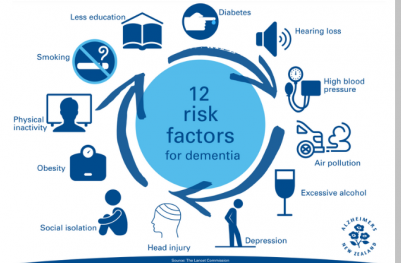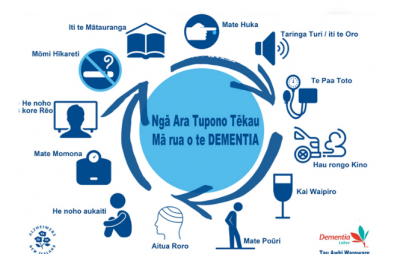Although there's no cure for dementia, there are many things you can do yourself and with your whānau and friends to continue to enjoy your life. These include:
- getting support – contacting a dementia support organization as soon as you know you or your family member has dementia is one of the most helpful things you can do.
- making lifestyle changes
- doing mind and memory-based activities.
- cognitive stimulation therapy.
Lifestyle changes
It isn't possible to prevent dementia gradually worsening, but there are things you can do to keep your brain cells as healthy as you can:
- Get some exercise most days
- Avoid smoking, alcohol and other substance use. If that’s not possible, cut down.
- Eat a healthy diet
- Get enough sleep.
Mind and memory-based activities
These could include:
- keeping up your social activities – they’re good brain exercise, and loneliness makes brain function worse. If you have hearing loss, this might mean getting a hearing aid.
- cognitive rehabilitation, where a health professional helps you achieve a goal, eg, learning to use a mobile phone
- life story work, where you use a scrapbook, photo album or electronic app to remember and record details of your life
- music and creative arts therapies to keep your brain active and help you express your emotions
- sensory stimulation such as aromatherapy, massage or bright light stimulation – discuss these with your healthcare provider beforehand
- doing brain exercises such as puzzles, and practicing memory strategies.
Cognitive stimulation therapy
Cognitive stimulation therapy (CST) is a structured group treatment developed for people with mild to moderate dementia. It consists of 14 sessions with a range of activities and discussions aimed at improving your mental and social functioning. The sessions actively engage people with dementia, providing a good learning environment and the social benefits of being part of a group. CST has been found to be helpful for older people with a clinical diagnosis of mild to moderate dementia.
Arrange a care planning meeting
Plan ahead so that you have more say in your future. Arrange a meeting (or get someone else to do it) with all the people involved in your care. This may include your carer, whānau members, or your doctor or nurse.
Agree on a care plan to support you to stay as well as possible for as long as possible. This might include:
- having a driving assessment
- arranging enduring power of attorney
- writing or updating your will
- developing an advance care plan
- accessing services to help you stay independent for as long as possible
- learning about your condition.
Read more about these below.
Having a driving assessment
Driving requires quick reflexes and decision making. Having a driving assessment will help you work out whether it's safe for you to continue driving for now, and if not, how you will manage without driving. Read more about dementia and driving and ways to manage without a car.
Arranging enduring power of attorney
Having an Enduring Power of Attorney (EPA) means you can have peace of mind that you have decided, ahead of time, who you trust to make decisions for you if you can’t decide for yourself. Read more about enduring power of attorney.
The Public Trust(external link) offers free 30 minute consultations for people with dementia, their families and caregivers. To book an appointment phone 0800 371 471.
Writing or updating your will
A will sets out your wishes in terms of who to leave your possessions and money to and states who you would like to carry out your wishes. It can include special instructions for a funeral. If you don’t have a will, it could also put your family into legal and financial difficulties. Learn more about making a will.(external link)
Developing an advance care plan
An advance care plan is a way to record your wishes for your current and future medical care. It's an ongoing process of talking with those closest to you and getting information to help you make decisions about your care. It can include end of life planning. Read more about advance care planning.
Learning about your condition
Learning about dementia can help you plan for the future as well as stay independent for as long as possible. You will find resources and other links under More information below. It’s important for your family to understand what’s happening, so they can help you and also keep themselves well. There's information about this on our dementia for caregivers page.
Apps reviewed by Healthify
You may find it useful to look at some dementia apps, exercise apps for older adults, and carer support apps.











